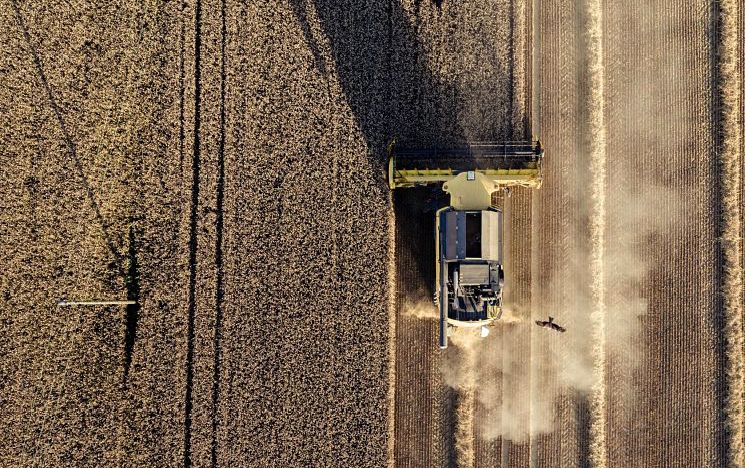From blackboard to food bowl – how mathematics is helping to feed the growing global population
Working alongside a team of biologists, mathematicians Dr Konstantin Blyuss and Dr Yuliya Kyrychko helped to develop a chemical-free and organic-friendly alternative to pesticides that increases crop yields by up to 60 per cent.

Photo by on
Among the most urgent challenges facing the world today is how to feed our growing global population. And with the climate crisis increasingly triggering unpredictable weather patterns affecting crop production, it is clear that this is a problem we must tackle.
It’s a source of hope, therefore, that two ÄűĂĘĘÓƵ mathematicians have successfully modelled an environmentally friendly and pesticide-free way to boost crop production. and worked alongside biologists at the National Academy of Sciences of Ukraine to design a chemical-free way to curtail the crop-killing activity of parasitic worms called nematodes.
Their modelling helped develop natural biostimulants that significantly increase crop yields, and are compatible with organic farming. These biostimulants are now used by major organic farming businesses in Ukraine.
Blyuss, Reader in Mathematics in the School of Mathematical and Physical Sciences at the ÄűĂĘĘÓƵ, says: “Can mathematical modelling help boost crop yields? This is the question we asked ourselves. There are places in the world where people are wholly reliant on growing a particular crop as an income. But the global population is rising by about 1% per year. And the climate crisis is creating an unpredictable situation for farmers.
“Unseasonal or extreme weather can be catastrophic for crop growers and their communities. Around the globe, including in parts of Africa and South East Asia, farmers are going to need something in their toolbox to help them tackle this problem. We believe our technique has the potential to help them reap more reliable and sustainable crop yields in the years ahead.”
How does it work?
The technique is called ‘RNA interference’ (RNAi) and it specifically targets nematodes, which are responsible for an estimated $130 billion worth of crop losses every year. It doesn’t use chemicals in the way traditional pesticides do, which indiscriminately harm other insects. Instead, the technique works by harnessing the power of naturally occurring bacteria in the soil. These bacteria release a compound, or ‘biostimulant’, which silences the nematode’s genes by attacking the proteins inside it. The biostimulants also ‘switch off’ the plant’s own genes that are affected by the nematodes, making it much harder for the parasite to harm the crop. It specifically targets nematode genes and therefore leaves other creatures – such as bees and mammals - unaffected.
The team’s mathematical models explained how RNA interference works in plants and shows the most effective way for farmers to apply the biostimulants to keep the crop safe from the harmful nematodes.
Boosting crop yields
Working directly with plant biologists, Blyuss and Kyrychko translated their theoretical findings into natural microbial biostimulants that have now been shown to increase crop yields of winter wheat and barley by around 20%, potatoes and cucumbers by 10-12% and 23-26%, and sunflowers and tomatoes by 20-60%. Aside from the obvious benefits of increased food production, this also creates benefits for local communities, including farmers, agribusinesses and biotech companies.
Of all the places for this work to be started, Ukraine is one of the most impactful. Blyuss explains: “Ukraine is known as ‘the bread bowl of Europe’. Owing to its highly fertile soil, it is the world’s largest producer of sunflower seeds, and it is a top producer of potatoes, wheat, barley and corn. And it’s the third largest exporter of agricultural products to the EU after Brazil and the United States. If we were going to implement our technique anywhere, I’m thrilled we were able to do it in Ukraine where it could have such a significant impact.”
Leading the way for an organic future
Organic farmers are unable to use conventional pesticides to protect their product, and so are at particular risk of crop losses. In this respect, since new biostimulants are based on naturally-occurring compounds from the soil bacteria, rather than chemicals, they can be used by organic farmers to reduce their risks and increase crop yields. Over time, therefore, it makes their products more affordable.
The insights from the mathematical models developed by Blyuss and Kyrychko have been used by Ukrainian biotech companies to develop natural and organic biostimulants. Some of these have been approved for organic farming and have received international “organic standard” certification, and are now used by some of the largest organic farming companies in Ukraine.
The team’s work has rightly received great acclaim. In 2019, Blyuss and Kyrychko were awarded the Letters of Gratitude by the Prydniprovsky Scientific Centre of the National Academy of Sciences of Ukraine, which is the highest honour that can be awarded to any scientist in Ukraine. Their work also attracted widespread attention in key media outlets around the globe.
Kyrychko says: “As mathematicians, there can be a disconnect between what we calculate and what happens in practice. We can write whatever equations we like on a blackboard but how do we know they’ll actually work? The fact that our modelling has survived the test of reality is hugely gratifying. We can see that the models we developed were not just equations: they’ve been translated into something that will really positively contribute towards addressing a major global challenge.”
Contact us
Research development enquiries:
researchexternal@sussex.ac.uk
Research impact enquiries:
rqi@sussex.ac.uk
Research governance enquiries:
rgoffice@sussex.ac.uk
Doctoral study enquiries:
doctoralschool@sussex.ac.uk
Undergraduate research enquiries:
undergraduate-research@sussex.ac.uk
General press enquiries:
press@sussex.ac.uk